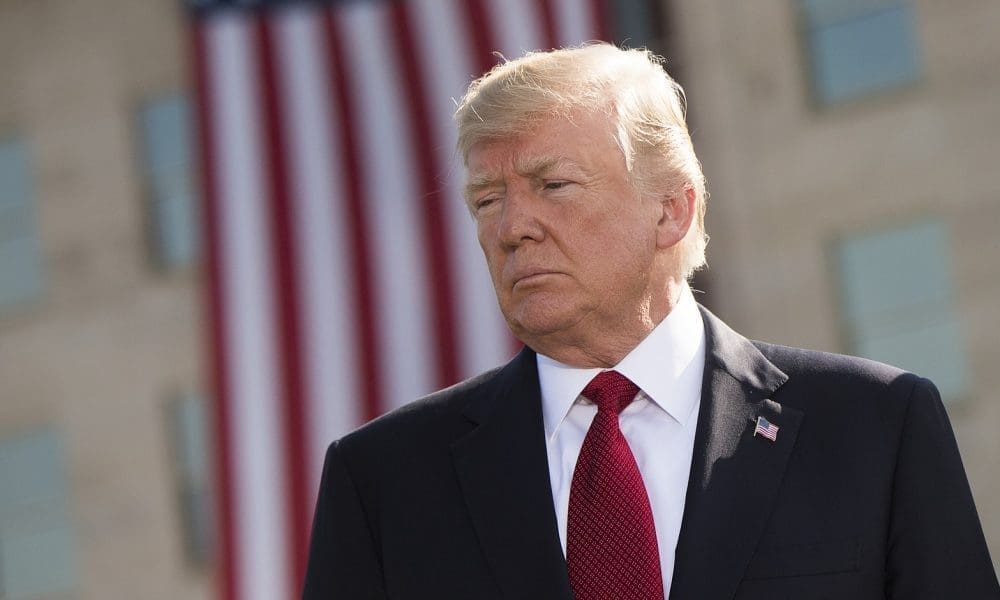featured
Silk Road Drug Market Operator Pardoned By Trump Calls For More Prisoners To Be Freed, As Democrats Criticize His Clemency
Published
1 month agoon

Ross Ulbricht—who was serving a life sentence over a conviction for running a dark web illicit drug market before being pardoned by President Donald Trump—says more clemency is needed, arguing that more than half of the inmates he met while incarcerated “have no business being in those cages for decades.”
At the same time, Trump is facing criticism from Democratic lawmakers over his various pardons, and they’re notably scrutinizing Ulbricht’s drug-related clemency in particular despite the party’s history of generally advocating for drug policy reform.
During a speech at a FreedomFest event last week, Ulbricht thanked supporters and the president for helping facilitate his release, getting tearful as he recounted the anxiety he felt after his potential clemency was first rumored and feeling his fate depended on an uncertain election outcome.
Despite that gratitude, however, he said he feels more needs to be done.
“I know the men that are in there. I can safely say—I was in there for over 11 years, I met lots and lots of people—and I can safely say that the majority of, more than half easily, at least, have no business being in those cages for decades. Those cages that dot our country like some kind of disease,” he said.
“They’re decent men. They’re not a imminent threat to anybody. They can be safely released, just like I was. And those who can’t, they’re in there,” Ulbricht said. “There are some in there that are danger. If we are to be a truly free country, we must treat even them, the least among us, with dignity and respect. None of us are free until we are all free, because as long as a system like this exists, it is a threat to freedom everywhere.”
Trump’s pardon was something of a surprise, as he made repeated pledges on the campaign trail to take extreme, punitive actions—including capital punishment—against people who sell drugs. The president had previewed plans to take the action in May 2024, but it came a day later than his initial commitment to release Ulbricht “on day one” of his presidency.
“I keep getting the advice to move on with my life—to put the past behind me, stop thinking about prison and forget what happened. I can’t do that,” Ulbricht said in his speech. “I can’t forget where I’ve been—can’t forget what I’ve seen. I can’t forget the men that are still in there. Prisoners are the least among us. They are the bottom rung of society. How we treat them reveals who we are as a nation [and] as people.”
“I’m here to tell you that if you care about freedom and liberty, then you must care about what goes on inside those cages. It’s true. It just is. That’s where people are stripped of their freedom. That’s where liberty is lost. I’ve been through the belly of that beast and come out the other side. I’ve seen the oppression and dehumanization firsthand. I’ve lived it.”

Calls for prison, sentencing and drug reform are common among Democratic lawmakers. But in this case, there’s evidently a relative lack of sympathy in Ulbricht’s pardon case among some members.
In a memorandum from staff for the Democratic minority of the House Judiciary Committee that was distributed to lawmakers on Tuesday, the panel detailed complaints with the president’s multiple controversial clemency actions, which also includes many involved in the January 6 insurrection.
The focus of the memo is on the financial cost of pardoning people in terms of lost restitution and fines after an incarcerated person is given the presidential forgiveness. The committee’s staff “estimates that President Trump’s pardons could deprive the pardoned offenders’ victims (and other survivors) of approximately $1.3 billion in restitution and fines owed to them and American taxpayers,” it says.
But it also makes a pointed criticism of Ulbricht’s clemency.
“The pardoned criminal plutocrats include people like Ross Ulbricht who operated a major underground online black market which drug dealers used to deal hundreds of pounds of illicit drugs into both American and foreign communities,” it says, using sharp language that departs from how progressives tend to discuss drug criminalization issues.
“He was sentenced to life in prison before being pardoned by President Trump,” it says. “Despite the numerous people harmed by Mr. Ulbricht’s breathtaking crimes facilitating traffic in narcotics and opioids, President Trump on January 21 explicitly relieved him of the forfeiture and fines he was ordered to pay, which totaled an astonishing $184 million.”
Ulbricht had been sentenced to life in prison for operating the dark web market known as the Silk Road from 2011 to 2013.
The pardon also represents a political departure for Trump, who in 2023 defended his position that people who sell illicit drugs should be quickly convicted and executed, touting countries like China and Singapore for enforcing the lethal penalty against drug offenders. Trump said that capital punishment “is the only way you’re going to stop” addiction.
Photo courtesy of Wikimedia.

Author: mscannabiz.com
MScannaBIZ for all you Mississippi Cannabis News and Information.
You may like
-


88 Years of Federal Marijuana Prohibition — It’s Time To End It
-


Georgia lawmakers reevaluate medical cannabis, hemp regulations
-


Federal hemp product ban stalls in Senate (Newsletter: July 30, 2025)
-


Cannabis Workers Report Illness After Paint Fumes at TerrAscend Dispensary
-


RiverBank, Green Check Launch Strategic Cannabis Banking Partnership Through DCI’s Direct-to-Bank Integration
-


Cannabis reform left off DEA priority list, despite pledge from Trump’s pick (Newsletter: July 29, 2025)
featured
88 Years of Federal Marijuana Prohibition — It’s Time To End It
Published
1 hour agoon
July 30, 2025

Saturday, August 2nd, marks the 88th anniversary of the signing of the Marihuana Tax Act, the first federal marijuana prohibition law.
Since its inception, the criminalization of the marijuana plant and the stigmatization of those who consume it has been predicated almost entirely upon the promotion of gross exaggerations, racial stereotypes, and outright lies.
For instance, a July 6, 1927 story in the New York Times, headlined “Mexican Family Goes Insane,” farcically claimed: “A widow and her four children have been driven insane by eating the marihuana plant, according to doctors, who say there is no hope of saving the children’s lives and that the mother will be insane for the rest of her life.”
An academic paper titled “Marijuana,” published in 1933 in The Journal of Law and Criminology, similarly made over-the-top allegations about the plant’s supposed dangers. The authors wrote, “The inevitable result [of consuming cannabis] is insanity, which those familiar with it describe as absolutely incurable, and, without exception ending in death.”
In 1937, Harry J. Anslinger — America’s first ‘Drug Czar’ — lobbied Congress to ban cannabis nationwide. He did so over the staunch objections of the American Medical Association, which disputed the government’s false claims that cannabis use invariably induced violence, insanity, and death. Undeterred by the AMA’s opposition, Anslinger relied almost entirely upon racist rhetoric to persuade lawmakers. “There are 100,000 total marijuana smokers in the U.S., and most are Negroes, Hispanics, Filipinos, and entertainers. Their Satanic music, jazz and swing, result from marijuana use,” he asserted. “This marijuana causes white women to seek sexual relations with Negroes, entertainers, and any others.”
Fast-forward to 1971. That’s when the Nixon administration declared drug abuse to be “public enemy number one.” The lynchpin of this campaign was stamping out the use marijuana, which Congress had just classified as a Schedule I controlled substance — the strictest federal category available. Yet, privately, Nixon acknowledged that he did not think cannabis was “particularly dangerous,” and he lamented the “ridiculous” penalties faced by those arrested for possessing it.
Nonetheless, his administration publicly doubled down on the mythical marijuana threat for its own political gain. As his domestic policy chief, John Ehrlichman, later acknowledged, “We couldn’t make it illegal to be either against the (Vietnam) war or Black,” but we could get “the public to associate the hippies with marijuana and Blacks with heroin.”
By “criminalizing both heavily,” Ehrlichman explained, “we could disrupt those communities. We could arrest their leaders, raid their homes, break up their meetings, and vilify them night after night on the evening news.”
“Did we know we were lying about the drugs?” he asked. “Of course we did.”

Fifty-plus years and nearly 30 million marijuana-related arrests later, cannabis remains categorized as a Schedule I controlled substance — the same classification as heroin — and many politicians and prohibitionists continue to reiterate many of these same myths. Yet, despite their claims, mounting evidence affirms that cannabis is not a ‘gateway drug,’ it doesn’t sap users’ motivation, it doesn’t make consumers violent, and it doesn’t make them crazy.
Slowly but surely, the public is learning and accepting the truth.
Survey data compiled by the Pew Research Center finds that only about one-in-ten Americans support the federal government’s blanket criminalization of marijuana. Moreover, according to Gallup, 70 percent of U.S. adults think “the use of marijuana should be legal.”
That’s an increase of 19 percentage points since 2014 when Colorado and Washington became the first states to implement adult-use cannabis legalization. Twenty-four states have now done so — and no state has ever repealed marijuana legalization. In short, the more familiar the public becomes with legalization through first-hand experience, the more they like it. And the less likely they are to believe longstanding prohibitionist rhetoric and lies.
After nearly a century of canna-bigotry, the truth couldn’t be clearer. Marijuana prohibition has been a fraud from the beginning — often propagated by politicians and bureaucrats who were in on the sham. It’s high time we end it.
Related

Author: mscannabiz.com
MScannaBIZ for all you Mississippi Cannabis News and Information.
featured
Federal hemp product ban stalls in Senate (Newsletter: July 30, 2025)
Published
3 hours agoon
July 30, 2025
AG Bondi on marijuana user gun rights; FDA head links cannabis to psychosis; Fed report: Youth use stable as legalization spreads; MA psychedelics
Subscribe to receive Marijuana Moment’s newsletter in your inbox every weekday morning. It’s the best way to make sure you know which cannabis stories are shaping the day.
Your support makes Marijuana Moment possible…
Hold on, just one second before you read today’s news. Have you thought about giving some financial support to Marijuana Moment? If so, today would be a great day to contribute. We’re planning our reporting for the coming months and it would really help to know what kind of support we can count on.
Check us out on Patreon and sign up to give $25/month today:
https://www.patreon.com/marijuanamoment
/ TOP THINGS TO KNOW
Senate leaders agreed to remove language to ban hemp products from appropriations legislation in response to Sen. Rand Paul’s (R-KY) threat to block the large-scale spending measure over his concern the provision would “destroy” farmers in his state.
Attorney General Pam Bondi filed a proposed rule on restoration of gun rights for people disarmed under federal law that says certain applicants, including marijuana consumers, would be ineligible for relief because they have “a lack of respect for the law and potential dangerousness.”
Food and Drug Administration Commissioner Marty Makary said he has “serious concerns about people using these cannabis products”—arguing that “cannabis use disorder is a real thing, and…there are now studies linking it to psychosis and even cardiovascular problems.”
- He made the comments at an event announcing that the agency is recommending the Drug Enforcement Administration schedule 7-OH, an opioid-like compound that is produced in small amounts by the kratom plant.
A new federal report from the Substance Abuse and Mental Health Services Administration shows that marijuana use “remained stable among adolescents and young adults” in recent years even as more states legalized cannabis for adults—contrary to prohibitionist fears.
Federal researchers at the National Institute of Standards and Technology published a new study showing that “THC concentration in breath can increase after the ingestion of cannabis-infused edibles”—calling the first-ever results on the topic an “important step forward” in detecting marijuana-impaired driving.
The Massachusetts Psychiatric Society is calling on lawmakers to pass a bill to decriminalize psilocybin—which advocates say is the first time any branch of the American Psychiatric Association has endorsed psychedelics reform legislation.
/ FEDERAL
Sen. Patty Murray (D-WA) is calling for a Seattle area resident to be allowed to remain in the U.S. ahead of an immigration check-in, saying it is “beyond wrong to deport a man with an American wife and two American children for trying to purchase marijuana nearly two decades ago, a substance that has now been legalized in Washington state.”
/ STATES
North Carolina Gov. Josh Stein (D) appointed additional members to the Advisory Council on Cannabis.
Florida’s agriculture commissioner reported that more than 70,000 packages of illegal hemp products have been removed in the past two weeks.
The Georgia House Blue-Ribbon Study Committee on Georgia’s Medical Marijuana and Hemp Policies held a hearing.
A former Colorado Senate majority leader authored an op-ed calling on Pennsylvania lawmakers to legalize marijuana.
New York regulators informed 152 marijuana retailers that the need to find new locations after a review determined the way officials calculated proximity to schools and churches was incorrect.
Minnesota regulators published updated guidance on obtaining marijuana business licenses.
Vermont regulators published guidance on cannabis business governing documents.
California regulators held a hearing on rules to make a hemp product ban permanent.
Connecticut regulators suspended a business’s lottery agent sales license over alleged unlicensed cannabis sales.
Massachusetts regulators will begin accepting cannabis social equity program applications on Friday.
—
Marijuana Moment is tracking hundreds of cannabis, psychedelics and drug policy bills in state legislatures and Congress this year. Patreon supporters pledging at least $25/month get access to our interactive maps, charts and hearing calendar so they don’t miss any developments.![]()
Learn more about our marijuana bill tracker and become a supporter on Patreon to get access.
—
/ LOCAL
The Reading, Pennsylvania City Council approved a marijuana decriminalization proposal.
/ INTERNATIONAL
Colombia’s Justice Ministry published a draft decree that would allow pharmacies to dispense psychoactive medical cannabis flower.
New Zealand regulators published medical cannabis advertising guidelines.
/ SCIENCE & HEALTH
A study of medical cannabis treatment for adolescents with Tourette syndrome found that “statistically significant improvement was observed in parent and clinician reports on tics, and behavioural and emotional issues and quality of life as reported by the parent and young person.”
A study found that “there is great interest and positive attitudes towards cannabis use among patients with cancer.”
/ ADVOCACY, OPINION & ANALYSIS
Community Anti-Drug Coalitions of America is asking its supporters to urge their U.S. senators to keep hemp product ban language in appropriations legislation.
The Houston Chronicle editorial board is urging Texas lawmakers to pass hemp regulation legislation.
/ BUSINESS
Tilray Brands, Inc. reported quarterly net revenue of $224.5 million and a net loss of $1.27 billion.
Canopy Growth Corporation entered into an agreement with lenders to make three prepayments that are expected to reduce its senior secured term loan by $50 million by March 31, 2026.
Make sure to subscribe to get Marijuana Moment’s daily dispatch in your inbox.

Author: mscannabiz.com
MScannaBIZ for all you Mississippi Cannabis News and Information.
featured
Cannabis Workers Report Illness After Paint Fumes at TerrAscend Dispensary
Published
7 hours agoon
July 30, 2025
[PRESS RELEASE] – CUMBERLAND, Md., July 29, 2025 – Workers at The Apothecarium, a cannabis dispensary in Cumberland, Md., owned by TerrAscend, have reported serious health symptoms following exposure to paint fumes inside the facility. According to multiple employee accounts, workers experienced headaches, nausea, dizziness and vomiting after painting occurred without sufficient ventilation or notification.
Several of those affected were unable to complete their shifts or return to work the following day. Workers have also reported that they were required to use their own paid time off (PTO) to recover, despite asserting that the illnesses were directly caused by the working environment.
In response, several employees have filed official complaints with the Maryland Occupational Safety and Health Administration and the federal Occupational Safety and Health Administration.
Both agencies have confirmed receipt of the complaints, and an active investigation is currently underway. Additionally, workers have spoken with elected officials and with workers’ comp lawyers.
Workers requested safety data sheets during the initial painting incident on July 2, but were not provided those until the fourth week of July. Federal and state laws require that an employer immediately provide safety data sheets to workers upon request when chemicals are being used at their workplace
According to union representatives, the initial incident involving indoor painting and a spike in air quality concerns occurred in early July. Workers requested that a union-provided air quality monitor be used to assess safety levels, but the company initially declined and then delayed that request for days. The workers and union officials attempted to address the issue of abatement, but the facility was reportedly painted again on or around July 21, leading to a second round of reported illness among staff.
During that second incident, the air monitor recorded elevated total volatile organic compound (TVOC) levels, which are known to be associated with symptoms like those described by workers. In response, the company questioned the accuracy of the monitor, which was not a company-provided device.
These incidents come amid a larger labor dispute, as workers at the Cumberland location voted in August 2024 to unionize with the United Food and Commercial Workers (UFCW) Local 27. Since then, union representatives have claimed that TerrAscend has delayed bargaining efforts and refused to agree to basic contract standards like just cause protections.
“These workers showed up to do their jobs, and instead they got sick,” Local 27 President Jason Chorpenning said. “The company has a responsibility to provide a safe workplace. No worker should be made to use their own paid time off just to recover from something they were exposed to on the job. We’re not going to stop fighting until the workers get justice, safety and a fair contract.”
Local 27 is calling for:
- A halt to all chemical or painting activity inside the facility without a third-party clearance;
- Restoration of all PTO taken by workers for illness related to these incidents; and
- Immediate and good-faith bargaining toward a first union contract.

Author: mscannabiz.com
MScannaBIZ for all you Mississippi Cannabis News and Information.

88 Years of Federal Marijuana Prohibition — It’s Time To End It

Georgia lawmakers reevaluate medical cannabis, hemp regulations

Federal hemp product ban stalls in Senate (Newsletter: July 30, 2025)

Cannabis Workers Report Illness After Paint Fumes at TerrAscend Dispensary

RiverBank, Green Check Launch Strategic Cannabis Banking Partnership Through DCI’s Direct-to-Bank Integration

Cannabis reform left off DEA priority list, despite pledge from Trump’s pick (Newsletter: July 29, 2025)

Does Keanu Reeves Consume Cannabis

New York State Office of Cannabis Management miscalculated distances between schools, dispensaries

Texans Deserve Choice, Not a Monopoly: Texas Hemp Business Council Urges Lawmakers to Defeat SB 5

Massachusetts Psychiatric Society Endorses Bill To Decriminalize Psilocybin Possession

Georgia lawmakers reevaluate medical cannabis, hemp regulations

GOP Senator Rides To The Rescue Of Hemp

Goldflower Cannabis Opening 9th Florida Dispensary in Bonita Springs

Inside Morocco’s Cannabis Culture and Legal Industry Shift: From Kif to Clinics

Ky. Governor urges President Trump to oppose blocking cannabis rescheduling

Gap in cannabis education leaves medical providers in the dark

FDA Commissioner Links Use Of Cannabis Products To Heart Problems And Psychosis

New York Cannabis Regulators Messed Up Dispensary Location Guidance; 152 Stores Impacted

Richard Lee, Who Made Cannabis Legalization Inevitable, Has Died. His Mission Lives On

GOP Senator Successfully Blocks Federal Hemp THC Ban In Key Spending Bill

RollPros Launches Blackbird XXL: The First-Ever Automated Blunt Rolling Machine

Ozzy Osbourne, Parkinson’s and the Promise of Magic Mushrooms: Could They Have Helped?

Pennsylvania: Reading City Council Adopts Municipal Decriminalization Ordinance

VIDEO: Guest Smokes Weed on Mario Kart After Attraction Breaks Down At Universal Studios Hollywood

Alert: Department of Cannabis Control updates data dashboards with full data for 2023

Connecticut Appoints The US’s First Cannabis Ombudsperson – Yes there is a pun in there and I’m Sure Erin Kirk Is Going To Hear It More Than Once!

5 best CBD creams of 2024 by Leafly

EU initiative begins bid to open access to psychedelic therapies

Free delta-9 gummies from Bay Smokes
New Study Analyzes the Effects of THCV, CBD on Weight Loss

5 best autoflower seed banks of 2024 by Leafly

May 2024 Leafly HighLight: Pink Runtz strain

Curaleaf Start Process Of Getting Their Claws Into The UK’s National Health System – With Former MP (Resigned Today 30/5/24) As The Front Man

Mississippi city official pleads guilty to selling fake CBD products

Discover New York’s dankest cannabis brands [September 2024]

Local medical cannabis dispensary reacts to MSDH pulling Rapid Analytics License – WLBT

Horn Lake denies cannabis dispensary request to allow sale of drug paraphernalia and Sunday sales | News

Press Release: CANNRA Calls for Farm Bill to Clarify Existing State Authority to Regulate Hemp Products

Nevada CCB to Accept Applications for Cannabis Establishments in White Pine County – “Only one cultivation and one production license will be awarded in White Pine County”

5 best THC drinks of 2024 by Leafly

The Daily Hit: October 2, 2024

6 best CBD gummies of 2024 by Leafly

5 best delta-9 THC gummies of 2024 by Leafly

Weekly Update: Monday, May 13, 2024 including, New Guide for Renewals & May Board meeting application deadline

People In This State Googled ‘Medical Marijuana’ The Most, Study Shows

PRESS RELEASE : Justice Department Submits Proposed Regulation to Reschedule Marijuana

Thailand: Pro-cannabis advocates rally ahead of the government’s plan to recriminalize the plant

Press Release: May 9, STIIIZY and Healing Urban Barrios hosted an Expungement Clinic & Second Chance Resource Fair
Trending
-

 California Cannabis Updates1 year ago
California Cannabis Updates1 year agoAlert: Department of Cannabis Control updates data dashboards with full data for 2023
-

 Breaking News1 year ago
Breaking News1 year agoConnecticut Appoints The US’s First Cannabis Ombudsperson – Yes there is a pun in there and I’m Sure Erin Kirk Is Going To Hear It More Than Once!
-

 best list12 months ago
best list12 months ago5 best CBD creams of 2024 by Leafly
-

 Business10 months ago
Business10 months agoEU initiative begins bid to open access to psychedelic therapies
-

 Bay Smokes1 year ago
Bay Smokes1 year agoFree delta-9 gummies from Bay Smokes
-

 cbd1 year ago
cbd1 year agoNew Study Analyzes the Effects of THCV, CBD on Weight Loss
-

 autoflower seeds10 months ago
autoflower seeds10 months ago5 best autoflower seed banks of 2024 by Leafly
-

 California1 year ago
California1 year agoMay 2024 Leafly HighLight: Pink Runtz strain





